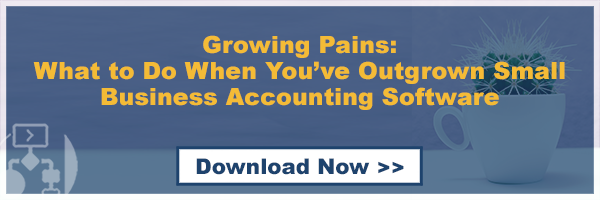10 More Signs You've Outgrown Your Small Business Accounting Software

As your business grows, it will outgrow its software – your new needs will no longer be met with small business accounting software – and it will be time for an enterprise resource planning (ERP) system. An ERP system is integrated business management software that manages data across multiple business activities, including accounting, project/service management, inventory control, human resource management, timekeeping, customer relation management, ad-hoc/dashboard reporting and much more.
In a previous blog, we wrote about 10 signs you've outgrown your small business accounting software.
Here are ten MORE signs it’s time to switch from small business accounting software to an ERP solution:
Your Transaction Volume is Growing
It seems like you're getting more transactions every day, and your software can't keep up. Failing to keep up with elevated transactions can lead to lower levels of customer satisfaction.
 You Have Multiple Locations
You Have Multiple Locations
Small business software is meant for small businesses with one – maybe two – locations. Once you have three or more locations, your non-integrated software cannot organize the data efficiently. This leads to inaccurate data that can lead to poor decision making.
You're Incurring Auditing Fees for Noncompliance
The Canada Revenue Agency is a difficult beast with many laws to follow and regulations to meet. An ERP keeps your data in order, making it easier to manage your profits and expenditures, which will allow you to avoid fines for noncompliance.
You Have More than 10 Users
With more users comes more data – and more lag if you're not using the appropriate software. And more lag, of course, leads to more wait time, which leads to less productivity.
You are Engaging in Multinational Transactions
Various countries use various currencies; you also have to consider exchange rates, taxes, shipping, and tariffs. Small business software isn’t built to handle that many variables.
You Have Large Amounts of Historical Data
Keeping historical data is essential, and not just for legal reasons. You can use historical data to track trends, follow customer demand, and forecast future orders. An ERP solution will not only store this data, it will also organize it for you.
You Need to Meet Industry Specific Requirements
Small business accounting software – QuickBooks, Microsoft Excel, etc. – tends to be very general and leaves little room for customization. An ERP can be configured to meet your industry-specific requirements.
Your Inventory Has Become More Complex
More transactions mean more inventory in your warehouse to keep up with demand. An ERP system, with its integrated database, offers more efficient inventory management.
Your System Freezes
With all these new transactions and extra data, your old software may grind to a – literal – halt when trying to deal with it. An ERP software has more than enough computing power to handle everything without locking up.
You're Using a Separate System for Payroll
Your QuickBooks or Excel spreadsheets are no longer able to deal with the number and variety of employees you have on the payroll. Eliminating them will reduce your use of manual labor and instances of errors, which will, in turn, increase productivity and efficiency.
The benefits of investing in an ERP system are clear: ease of handling increased transactions, better inventory control, more accurate data, improved productivity, less manual labor – and more.
Contact Asyma Solutions today to learn more about getting your own ERP solution.

